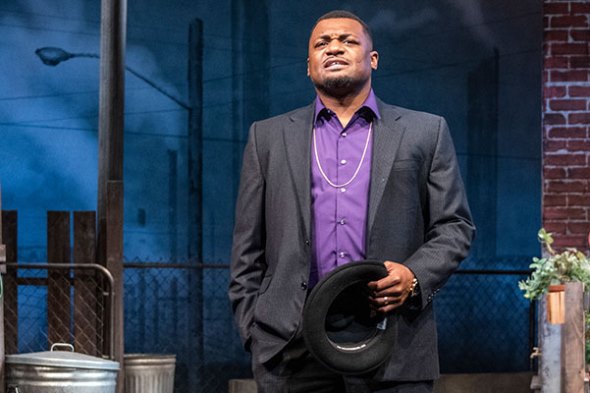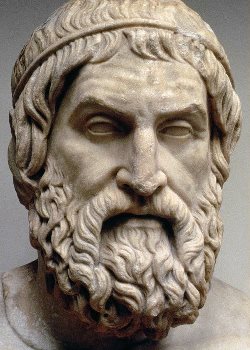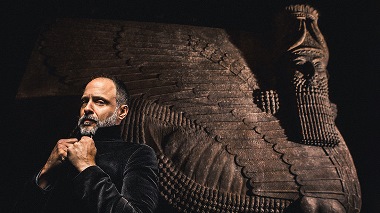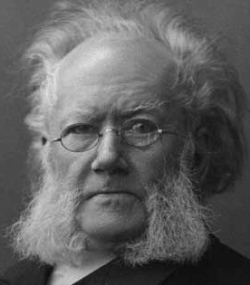Theater 2019-20: Court begins Oedipus cycle, continues Wilson, reframes ‘Iliad’ in a museum
Seventh in a series of season previews: August Wilson’s ‘King Hedley II’ opens season; ‘An Iliad’ prowls through Oriental Institute.
By Lawrence B. Johnson
Ask Court Theatre artistic director Charles Newell to sum up the company’s coming season, and he could begin with quite a list of projects, and he does – eventually. But at the top of Newell’s mind is the big, one might say really big, picture. “Artistically, financially, any way you might want to measure it,” he says, “this is the most ambitious season in Court’s history, and the riskiest.”
 The company will mount six productions, including the first two installments of an Oedipus cycle that will extend over two years, with Sophocles’ “Oedipus the King” and the Oedipus-themed musical “The Gospel at Colonus” both scheduled this season. Court also will stage for the third time “An Iliad,” a blazing one-man rethinking of Homer’s “Iliad,” but this time at the Oriental Institute, which is celebrating its centennial. The season leads off with August Wilson’s “King Hedley II,” the eighth play to be staged by Court in Wilson’s 10-part, decade by decade portrait of the African American experience – and the eighth to be directed at Court by resident artist Ron OJ Parson.
The company will mount six productions, including the first two installments of an Oedipus cycle that will extend over two years, with Sophocles’ “Oedipus the King” and the Oedipus-themed musical “The Gospel at Colonus” both scheduled this season. Court also will stage for the third time “An Iliad,” a blazing one-man rethinking of Homer’s “Iliad,” but this time at the Oriental Institute, which is celebrating its centennial. The season leads off with August Wilson’s “King Hedley II,” the eighth play to be staged by Court in Wilson’s 10-part, decade by decade portrait of the African American experience – and the eighth to be directed at Court by resident artist Ron OJ Parson.
“Just in terms of sheer numbers of designers and musicians, we’ve never put together a season quite like this one,” says Newell. And in the midst of it all, there’s Agatha Christie’s “The Mousetrap.” Says Newell, with dry understatement: “We wanted to find a different emotional temperature.”
The 2019-20 season in brief:
- “King Hedley II” by August Wilson (Through Oct. 13): Placing his hopes and dreams on the line, a man pieces together his life in Pittsburgh after seven years in prison. Family ties are tested and crime and retribution collide in August Wilson’s ninth play in the American Century cycle. This marks Court’s eighth production in its commitment to produce all 10 plays of the cycle. Nationally recognized for his direction of August Wilson’s plays, Court resident artist Ron OJ Parson again explores the depth of humanity in Wilson’s portrait of African American life. “This is the part of Wilson’s century cycle set in the 1980s,” says Newell, “and like ‘Radio Golf,’ it isn’t as often produced as some of the other plays, so it’s probably going to be a discovery – really, an opportunity – for a lot of people. It’s a multidimensional story about a community and it shares some characters, or offspring of characters, with other plays in the cycle.”
-
“Oedipus Rex” by Sophocles, translated by Nicholas Rudall (Nov. 7-Dec. 8): Oedipus, king of Thebes, seeks to cure his city of a mysterious plague by discovering the murderer of the former king. Sophocles’ seminal Greek tragedy brings to light enduring questions of identity, fate, and free will that continue to reverberate in the 21st century. This production, directed by Newell, begins Court’s Oedipus trilogy. “When I was a few years out of college, in 1983, I saw ‘The Gospel at Colonus’ at the Brooklyn Academy, and it changed my life,” says Newell. “It has been a lifelong ambition of mine to direct this show. We decided this year to go all in, and combine ‘Gospel’ with Sophocles’ ‘Oedipus’ – to look at Oedipus’ fate through the lens of redemption.”
- “The Mousetrap” by Agatha Christie (Jan. 16-Feb. 16, 2020): The Ralstons’ house becomes lethal when four guests are snowed in amidst reports of a woman’s murder. Agatha Christie’s craft for building skillful twists and shocking turns is on full display in this famed mystery, a shrine to the genre as a pillar of classic drama. “The Mousetrap” springs its traps in surprising ways. “It’s a classic mystery, so intricately and beautifully crafted,” says Newell. “It also shows how secrets can get us into trouble.”
-
“An Iliad” by Lisa Peterson and Denis O’Hare, after Homer’s “The Iliad” translated by Robert Fagles (Feb. 26-March 22, 2020, at the Oriental Institute): Rage, beyond expression or reason or appeasement, rips through the timeless modernity of “An Iliad,” a dramatic distillation of Homer’s epic. This fraught opus of glory and gore bristles in the one voice but many personas of the Poet, who frames the perpetual folly of war in the single, appalling, ever repeating travesty that was Troy. Reprising his one-man performances at Court in 2011 and ’13, Timothy Edward Kane this time will take his audience from gallery to gallery at the Oriental Institute, which is observing its centennial. Removing the play to this distinctive off-site setting, says Newell, “serves to celebrate the enduring power of storytelling across generations and civilizations. To draw on the vitality of the Institute’s galleries serves to further highlight the way that stories transcend geographic and temporal boundaries.”
-
“The Lady from the Sea” by Henrik Ibsen, translated by Rolf Fjelde (March 12-April 12, 2020): When a sailor returns to fulfill his promise, a lighthouse keeper’s daughter must choose between her landlocked marriage and the mesmerizing allure of the sea. Regarded as a watershed in Ibsen’s writing, “The Lady from the Sea” dissects issues of duty and marriage with raw emotion. “In this play, which many people probably don’t know, Ibsen directly addresses the role and power of women in his culture and in his time,” says Newell. “(Director) Shana Cooper uses physical movement and gesture in a very aggressive way. This is Ibsen not as you’ve seen him before.”
- “The Gospel at Colonus,” conceived and adapted by Lee Breuer, music composed by Bob Telson, original lyrics by Lee Breuer, adapted lyrics by Bob Telson and Lee Breuer (May 7-June 7, 2020): In reimagining the story of Oedipus as the centerpiece of an African American Pentecostal church service, “The Gospel at Colonus” becomes a redemptive celebration that breathes new life into a classic myth with a score of powerful gospel music. “This,” observes Newell from that long-ago, indelible encounter, “is a profound spiritual experience on stage.”





